The Class of 2020 navigates a rocky freshman year at college
Education. Their senior year of high school was stolen by a pandemic. Now, in their freshman year of college, local students face a new and difficult decision: wait it out, or continue their journey in the age of remote learning and social distancing.
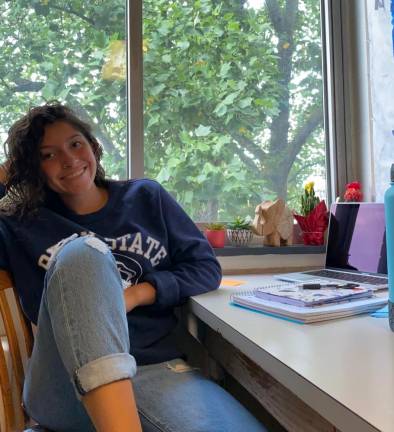
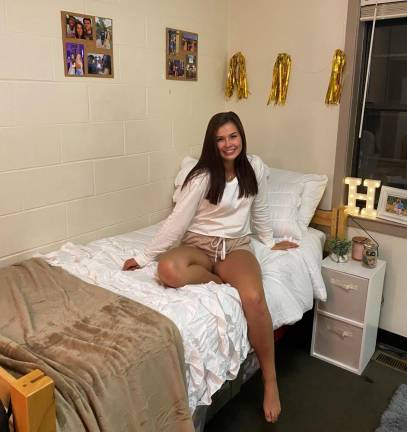

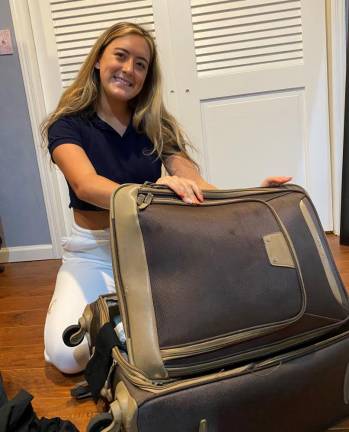
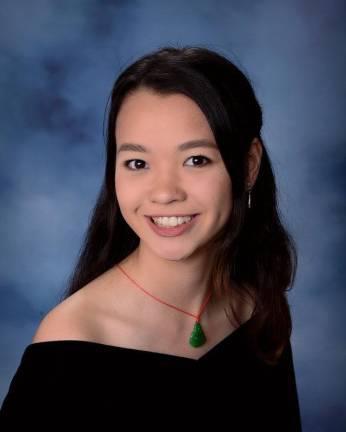
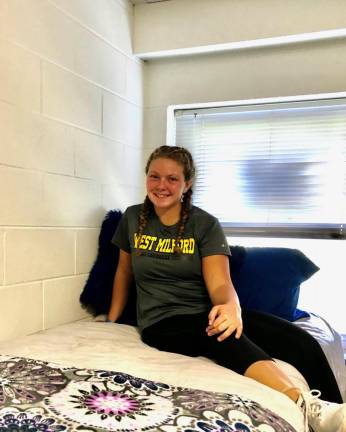
Back in May, we asked high school students from the Class of 2020 what their next steps were for college. This week, we checked in to see if things went according to plan.
They didn’t.
But the ever-resilient students are making the most of this unique year.
Penn State
Isabella Granada, a graduate of Lenape Valley High School in Stanhope, N.J., moved into her dorm at Penn State University on Aug. 17. She has two in-person classes, and the rest are online.
“I didn’t go to college, and this was my first child going to college,” said Isabella’s mom, Ximena. “At the beginning of her senior year I was a mess. I was like: ‘Oh my god, my baby, she’s a grown up!’”
But when the pandemic hit, her excitement turned to sadness.
“I felt bad,” Ximena said. “She was with me for five months. When I was her age, the last thing I wanted to do was be with my parents 24/7. So that made me change my perspective.”
The day Isabella started school was a happy one.
“When I dropped her off, my voice didn’t even crack,” Ximena said. “I was so happy, so full of joy for her to be able to experience this. Even if she’s only there for a month or two, it’s something.”
She said the move-in process was incredibly organized, even on the large campus. Everyone wore masks and kept a safe distance from one another. Isabella’s roommate was scheduled to move in the following day.
Up until this week, Covid cases at Penn State had stayed fairly low. But now, more than 400 students have tested positive.
Isabella trusts Penn State to do the right thing, despite the rising numbers. The school has made “really large and meaningful efforts to make the community as safe as possible,” she said.
Volunteers walk around campus in blue tees that read “Mask Up or Pack Up,” and remind students to maintain social distancing or, if they get sloppy, pull their masks up over their noses. Students are required to wear masks everywhere they go. Residents must stay in their own buildings — there’s no visiting friends in other dorms. Some buildings aren’t even letting students visit those living on other floors. Instead, Isabella and her friends walk the sprawling, 8,000-acre campus.
“We’ve done a lot of walking,” said Isabella. “My average daily steps are about 12,000.”
The school has dedicated an on-campus hotel where Covid-positive students must quarantine, and a dorm building where students self-isolate as they await their Covid test results.
For now, Isabella’s making the most of her time on campus — and focused on staying safe. Although she’s confident that she would beat the virus if she got it, she definitely doesn’t want to pass it to her roommate, who has asthma. And she really doesn’t want to end up on a contact list and in self-isolation.
“I haven’t heard great things about that,” she said.
Most of the bonding with the other residents in her dorm has happened through group chats. Isabella’s floor was supposed to go on an outing to the campus creamery this week, but it was cancelled because of the uptick in cases.
Isabella said there’s talk of going fully remote if the university hits a certain threshold of positive cases, but that number hasn’t been released yet. She expects to hear more in coming days.
A good time for a gap year
Laurel Brower has been acting since she was ten. The graduate of Delaware Valley High School in Milford, Pa., has landed big roles in Off-Broadway productions and was looking forward to taking the next step as a performing arts major at Rutgers University.
But Rutgers is fully remote this year – and isn’t discounting the tuition, which is especially high for out-of-state students like Brower. Only grad students are allowed in the dorms, and all classes are online.
If she went through with school as planned, Laurel would be remoting in from home and paying more than $14,000 per semester for her tuition alone – and that’s before added fees, such as a $970 “off-campus fee” and a $1,145 “campus fee.”
The cost just didn’t match up with the educational experience Laurel was planning on. So when Rutgers offered students a gap year, she took it.
It wasn’t an easy decision. Watching other friends go away to school was tough. Putting her own college experience on hold was a major disappointment.
“But at the same time, I’m telling her, ‘Look at these kids, they’re in their dorms, doing work in their dorms,’” said Laurel’s mother, Kelly Brower. “They’re not even going to classes. Look at these other schools, they’re getting huge numbers of cases – they’re going to be home.’”
Laurel is now using the year to work on her acting career, save money, and make money. Last week she had a photo shoot with her talent agency, which will send the photos out to clients who might hire her for commercials and TV pilots, or as a model.
Life on an empty campus
Hailey Minter, a graduate of Vernon Township High School in New Jersey, is one of the few students on campus right now at La Salle University in Philadelphia. Only students in special circumstances, such as athletes and international students, are allowed on campus. Everyone else is taking classes remotely.
All of Hailey’s classes are online. La Salle was supposed to do all-remote learning for two weeks starting Aug. 17, and then move students back to campus. But the week before everyone was supposed to move in, the school announced that the entire semester would be held online.
She called the school that day to ask if she could get onto campus. The following week she heard back that she would be allowed to move in.
She has her own room in a townhouse with three other girls. The university building is open, as some professors broadcast their courses from their classrooms. Everything from the dining hall is to-go. Masks must be worn the entire time using in the library.
“That goes for everywhere on campus,” said Hailey. “If we leave our townhouse, we’re technically supposed to wear a mask.”
Hailey’s keeping herself plenty busy. She’s in multiple extracurriculars, all virtual for now, including the business scholars and business leadership programs, the student government association, and the dean’s advisory board. She is team captain of the freshman class Explorathon, a dance marathon benefiting the B+ Cancer Foundation.
She says classes are going well so far. Students and professors are patiently learning how to do college virtually together. Hailey is thankful for the experience and opportunity.
“I know so many students weren’t able to attend their universities due to Covid and financial concerns, so I am very grateful that I’m here,” said Hailey. “It’s different, but I am learning and I’m making the best of it. I’m a very big mindset person: if you have a good mindset, you’ll have a good experience. I’m just trying to make the best of what I have for the fall semester and am praying that the spring semester is in person.”
Outsmarting prerequisites
Bill King and his daughter, Catherine, didn’t find out that her classes at SUNY Cobleskill would be nearly 100% remote until mid-August, when her schedule arrived in the mail. She was supposed to be moving into the dorms in just a few weeks.
Only one of her classes was offering in-person learning, and was doing so on a hybrid schedule. Everything else was online. Food was to-go from the dining hall.
But full tuition, room, and board were due, regardless of the limited access to the campus.
Bill pumped the brake. It didn’t make sense to pay for Catherine to be away at college when she would be holed up in her dorm room for remote learning.
“I wasn’t going to shell out $27,000 – full tuition, pay for the dorms,” said Bill. “Why?”
Instead, Catherine, a graduate of Warwick Valley High School in Warwick, N.Y., is moving forward with her back-up plan, knocking out prerequisites at a local community college, SUNY Orange, for a fraction of the cost. Since both schools are part of the SUNY system, credits should transfer seamlessly.
For now, Catherine’s college journey at SUNY Cobleskill is on hold. If the campus returns to a sense of normalcy in January, Catherine will be back next semester. If not, she’ll check back in for the fall 2021 semester.
“She definitely was upset,” said Bill. “But she’s okay now. She’s living life, taking it as it is.”
Despite her college plans getting derailed at the last second, Catherine’s goals remain intact. When she gets back to SUNY Cobleskill, she’ll be attending the school’s College of Agriculture and Technology, majoring in Food Science. She hopes to work for The FDA one day.
Small school, big changes
Kate Burns just dropped her daughter, Renee, off at Monmouth University last week. Students were given two-hour shifts for the move-in process, allowing one family in each dorm room at a time. Renee’s roommate moved in between 8 and 10 a.m. From 10 a.m. to noon, the Burns family moved Renee in.
Renee graduated from West Milford High School in New Jersey and is now an accounting major. She plans to double major, with a minor in criminal justice as well.
She signed up for as many in-person classes as possible. She has one that’s in-person every Monday, and another that runs on a hybrid schedule. Everything else is remote.
Despite the masks and social distancing, Renee is making the most of her time at school. Monmouth has organized safe group activities to make the college experience as normal as possible. She recently joined a group hike to the beach to see the sunrise and attended a movie night on the football field.
Her dance team tryouts were cancelled, but Renee is hopeful they’ll be rescheduled soon.
Like at most schools, students at Monmouth fill out a health check questionnaire every day. They also need to pre-order their meals through an app and swing by the dining hall to pick it up.
The dining hall’s seating is open at very limited capacity, but Monmouth is taking advantage of the extra space on its 170-acre campus. The school has set up outdoor tents with lights for extra classroom, study, and dining space. When the weather starts to get cool, they plan to add propane tanks to keep the tents heated.
“They just ask: wear your masks, social distance, and we’ll make the best of this,” said Kate.
California, here we come
After being stuck at home in New Jersey during the chilly months of quarantine, Sparta High School graduate Isabella Sergent is ready to take on the West Coast, virtual learning or not.
Santa Clara University is totally remote this year. Isabella, a political science major, will be tuning in from the home of her grandparents, who live about an hour from campus. She will be flying out to California in just a few days.
Despite the all-virtual semester, students have already gotten in touch online through Facebook. “I’ve met so many people already,” she said.
Isabella knows other students who will be living near campus. The girl who was supposed to be her dorm roommate lives close by. Isabella is excited about meeting up with friends and exploring the great outdoors when she gets out there.
When she found out in early August that the school would be totally online, she briefly considered alternatives, such as community college. But she was already set on going to California.
“I love Santa Clara so much,” Isabella said. “I feel like I’m already invested in it.”
“I know so many students weren’t able to attend their universities due to Covid and financial concerns, so I am very grateful that I’m here. It’s different, but I am learning and I’m making the best of it. I’m a very big mindset person: if you have a good mindset, you’ll have a good experience.” --Hailey Minter